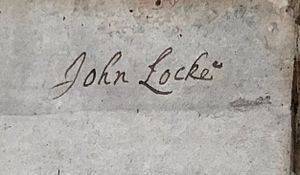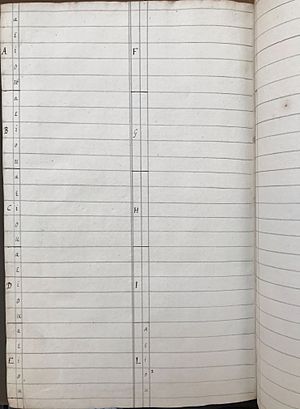John Locke facts for kids
Quick facts for kids
John Locke
|
|
|---|---|
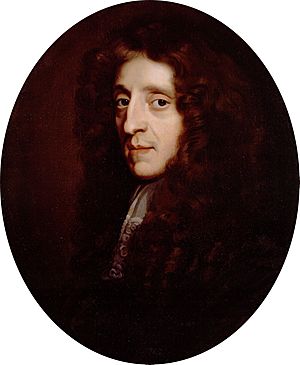
Portrait of John Locke by John Greenhill (died 1676)
|
|
| Born |
John Locke
29 August 1632 Wrington, Somerset, England
|
| Died | 28 October 1704 (aged 72) High Laver, Essex, England
|
| Nationality | English |
| Education | Christ Church, Oxford (BA, 1656; MA, 1658; MB, 1675) |
| Era | Age of Enlightenment |
| Region | Western philosophy |
| School |
|
| Institutions | University of Oxford Royal Society |
|
Main interests
|
Metaphysics, epistemology, political philosophy, philosophy of mind, philosophy of education, economics |
|
Notable ideas
|
List
Consciousness
Consent of the governed Inverted spectrum Labor theory of property Law of opinion Lockean proviso Molyneux's problem Argument from ignorance Natural rights (rights of life, liberty and property) Primary/secondary quality distinction Semeiotike (the doctrine of signs) Social contract Sortal State of nature Tabula rasa |
| Signature | |
 |
|
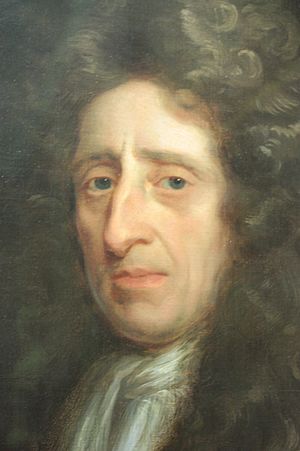
John Locke (born August 29, 1632 – died October 28, 1704) was an English thinker and doctor. He is known as one of the most important people of the Age of Enlightenment, a time when new ideas about government and human rights became popular. Many people call him the "father of liberalism". His ideas greatly changed how people thought about political philosophy, which is the study of how governments should work.
Locke's writings influenced famous thinkers like Voltaire and Jean-Jacques Rousseau. They also inspired the American Revolutionaries who fought for independence. His ideas about freedom and government are even found in the United States Declaration of Independence.
One of Locke's key ideas was about the mind. He believed that when we are born, our minds are like a "blank slate," or tabula rasa. This means we don't have any ideas built-in from birth. Instead, all our knowledge comes from what we learn through our senses and experiences. This idea is called empiricism.
Contents
Early Life and Education
John Locke was born on August 29, 1632, in a small village called Wrington in England. His parents were Puritans, a group of strict Protestants. His father, also named John, was a lawyer and served as a captain for the Parliamentarian forces during the English Civil War.
In 1647, Locke went to the famous Westminster School in London. He was only half a mile away when King Charles I was executed, but students were not allowed to watch. After Westminster, he went to Christ Church, a college at Oxford University, when he was 20.
Locke found the old-fashioned lessons at Oxford a bit boring. He was more interested in the new ideas of thinkers like René Descartes. Through a friend, he discovered medicine and the exciting new "experimental philosophy," which was about learning through experiments. He later became a member of the Royal Society, a group of important scientists.
He earned his first degree in 1656 and a master's degree in 1658. He also studied medicine and became a doctor in 1675. During his time at Oxford, he worked with famous scientists like Robert Boyle. In 1666, he met Lord Ashley, a powerful politician, who was very impressed with Locke.
John Locke's Career
Working with Lord Ashley
In 1667, Locke moved into Lord Ashley's home in London to work as his personal doctor. There, Locke continued his medical studies. His medical skills were put to the test when Lord Ashley became very ill. Locke helped guide his treatment, and Ashley survived. He believed Locke had saved his life.
Locke also worked as a secretary for important government groups dealing with trade and colonies. This helped him develop his ideas about how countries should trade and manage their money.
Lord Ashley was a leader of the Whig movement, a political group that wanted more power for Parliament and less for the King. Locke became very involved in politics through Ashley. Around this time, Locke wrote much of his famous book, Two Treatises of Government. This book argued against the idea of absolute monarchy (where a king has total power). Instead, Locke believed that government should be based on the agreement of the people it governs. His ideas about natural rights and government were very new and revolutionary for his time.
Time in the Netherlands
In 1683, Locke moved to the Netherlands. He was suspected of being involved in a plot against the King, though there wasn't much proof. He spent five years there. During this time, Locke had the chance to focus on his writing. He worked a lot on his book An Essay Concerning Human Understanding and wrote A Letter Concerning Toleration, which argued for religious tolerance.
Returning to England
Locke returned to England in 1689 after the Glorious Revolution, which brought a new king and queen to the throne and limited the power of the monarchy. Most of Locke's major books were published soon after his return, including his Essay Concerning Human Understanding, the Two Treatises of Government, and A Letter Concerning Toleration.
He spent his later years at the home of his close friend, Lady Masham, in Essex. Even though he had health problems, he became a hero to the Whig party. He talked with other great thinkers of his time, like Isaac Newton.
Later Life and Death
John Locke died on October 28, 1704. He is buried in the churchyard of High Laver, a village in Essex. He never married or had children.
During Locke's lifetime, many important events happened in England, such as the Great Plague of London and the Great Fire of London. He lived during a time when constitutional monarchy (where a king or queen's power is limited by laws) and parliamentary democracy (where people elect representatives to make laws) were just beginning to form.
John Locke's Philosophy
Locke had a huge impact on political philosophy, especially on modern liberalism. His ideas about liberty (freedom) and the social contract (an agreement between people and their government) later influenced Thomas Jefferson and the founding of the United States.
Locke's ideas about how our minds work also influenced the study of psychology. He believed we have "simple" and "complex" ideas, and how they connect helps us understand the world.
Ideas on Government
Locke's political ideas were based on the idea of a social contract. Unlike another famous philosopher, Thomas Hobbes, Locke believed that people are naturally reasonable and tolerant. However, he also thought that people could be selfish, especially when money became important.
Locke believed that in a "natural state" (before governments existed), all people were equal and independent. Everyone had a natural right to protect their "life, health, liberty, or possessions."
Because defending oneself in a natural state wasn't always enough, people created a civil society and a government. This government would help solve problems peacefully. Locke also believed in the separation of powers within a government, meaning different parts of the government (like law-making and law-enforcing) should be separate. He even thought that people had a right to overthrow a government if it failed to protect their rights. These powerful ideas greatly influenced the United States Declaration of Independence and the Constitution of the United States.
Wealth and Fairness
Locke thought that differences in wealth came from people agreeing to use money. He suggested that government should help balance the unlimited gathering of wealth with a fairer sharing of it. However, he didn't say exactly how the government should do this.
Key Ideas
Economics
How Prices Work
Locke had an early idea about how prices are set, which is similar to today's supply-and-demand theory. He believed that the price of something depends on how much of it is available (supply) and how much people want it (demand).
For money, he thought its value was mostly based on how much of it there was. For goods, he said their value came from how rare they were and how useful they were to people. He also thought that things like land had value because they could produce a steady income.
Thoughts on Money
Locke saw money as having two main jobs: first, to measure value (like a counter), and second, as a "pledge" to claim goods. He believed that real metals like silver and gold were best for international trade because everyone agreed on their value. Paper money, he said, was only valuable within the country that issued it.
Property and Labor
Locke used the word "property" in two ways. Broadly, it meant all human interests and goals. More specifically, it meant physical things we own. He argued that owning property is a natural right that comes from our work.
In his book Second Treatise, Locke said that nature itself doesn't offer much value. It's the effort we put into creating things that gives them value. From this, he developed his "labor theory of property": you gain ownership of something by putting your labor into it. He added that this is true "at least where there is enough, and as good, left in common for others."
The Human Mind
What is the Self?
Locke defined the "self" as "that conscious thinking thing... which is sensible, or conscious of pleasure and pain, capable of happiness or misery." He believed that our body is also part of what makes us a person.
Locke's book Some Thoughts Concerning Education explains how to educate the mind. He believed that education shapes a person, saying that "nine parts of ten are what they are... by their education."
He also wrote that the small things that happen to us when we are very young have a big and lasting effect. He called these "associations of ideas." These early connections are very important because they form the foundation of who we become. For example, he warned against letting a child be told that "goblins and sprites" are linked to the night. If this happens, "darkness shall ever afterwards bring with it those frightful ideas."
This idea became known as associationism. It greatly influenced how people thought about education and led to the development of psychology as a field of study.
John Locke's Library
John Locke loved collecting books and taking notes. By the time he died in 1704, he had over 3,000 books, which was a huge number for the 1600s. He carefully organized and kept his library. In his will, he made sure his books were given to his family members.
Most of his books and writings went to his cousin, Peter King. Over time, many of these books were bought by the Bodleian Library, Oxford in 1947. This library now has more than 800 of Locke's original books. Many of them still have his signature and notes he wrote in the margins.
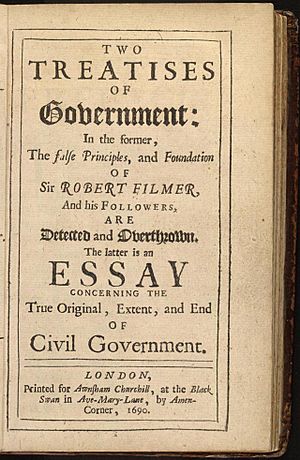
The books in Locke's library show his many interests. He traveled a lot in France and the Netherlands, and about 40% of his books came from those countries. His collection covered many subjects, including theology (religion), medicine, politics, law, and classical literature.
The Bodleian Library also has over 100 manuscripts (handwritten documents) by Locke. These show his activities and relationships with others.
Major Writings
List of Major Works
- 1689. A Letter Concerning Toleration
- 1690. A Second Letter Concerning Toleration
- 1692. A Third Letter for Toleration
- 1689/90. Two Treatises of Government
- 1689/90. An Essay Concerning Human Understanding
- 1691. Some Considerations on the consequences of the Lowering of Interest and the Raising of the Value of Money
- 1693. Some Thoughts Concerning Education
- 1695. The Reasonableness of Christianity, as Delivered in the Scriptures
- 1695. A Vindication of the Reasonableness of Christianity
Major Posthumous Manuscripts
(These were published after his death)
- 1660. First Tract of Government
- c.1662. Second Tract of Government
- 1664. Questions Concerning the Law of Nature
- 1667. Essay Concerning Toleration
- 1706. Of the Conduct of the Understanding
- 1707. A paraphrase and notes on the Epistles of St. Paul to the Galatians, 1 and 2 Corinthians, Romans, Ephesians
Images for kids
See also
 In Spanish: John Locke para niños
In Spanish: John Locke para niños
 | Aaron Henry |
 | T. R. M. Howard |
 | Jesse Jackson |


